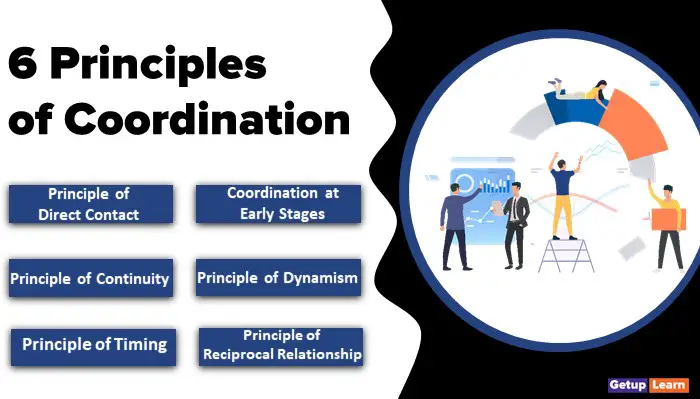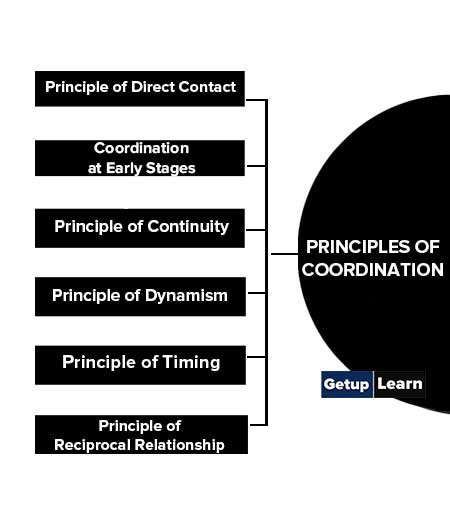
Table of Contents
Principles of Coordination
Coordination refers to the process of organizing and aligning the actions and activities of individuals or groups in order to achieve a common goal or objective. There are several principles that can be helpful in coordinating the actions of individuals or groups effectively.
These are the main principles of coordination:
- Principle of Direct Contact
- Coordination at Early Stages
- Principle of Continuity
- Principle of Dynamism
- Principle of Timing
- Principle of Reciprocal Relationship

Principle of Direct Contact
The principle of direct contact states that Coordination can be achieved by direct contact among people whose activities are to be coordinated. Such contact can be established through the provision of an effective communication system.
Direct contact helps in bringing agreement on work methods, actions and achievement of ultimate objectives. It helps to wither away the controversies and misunderstandings among organisational members as well as external parties.
The principle of direct contact is based on the theme that Coordination is better achieved through mutual understanding and not by force order or coercion.
Coordination at Early Stages
Coordination can better be achieved if it is attempted at the early stage of the work cycle that is at the planning stage. At the stage of planning such as objective setting, strategy and policy formulation, etc., Coordination can be sought from organisational members.
This may be done through their participation in the decision-making process. When members are involved in the decision-making process, they realise how their work performance affects other members of the organisation.
This happens because participative decision-making enables members to commit and agree on various issues. Conflict and in congruency are reduced which are major hurdles to effective Coordination.
Principle of Continuity
The principle of continuity states that Coordination should be treated as a continuous process; it should be taken on a regular basis. Coordination should be treated as a never-ceasing and never-ending exercise of all managers and in all functions. Follett has stated that Coordination emerges with the organisation and ends with it.
Read More About: Coordination: Definitions, Principles, Techniques, Process, Importance, Objectives
Principle of Dynamism
The principle of dynamism states that Coordination does not work on the basis of rigid and fixed basis but on a dynamic basis. Dynamism is required because changes occur in external factors, which necessitate changes in the organisation and its processes including Coordination.
When organisational changes take place, many old organisational practices do not remain workable. This is true for Coordination too.
Principle of Timing
The principle of timing involves that various organisational units and members should synchronise the timing of their work performance. One member of the organisation facilitates the working of another if he synchronises the timing of his work with the working of another.
For example, in an assembly work, the different stages of the work are interrelated in such a way that a subsequent stage can be undertaken only when the earlier stage has been completed. In such a case, Coordination of timing at different stages is important.
Principle of Reciprocal Relationship
A reciprocal relationship exists between two or more parties in which each party affects the functioning of others and in turn, is affected by others. In the organisational context, various departments may have reciprocal relationships though the amount of reciprocity may not be equal in the reciprocal relationship.
If a department is affected by some functions of another department but the former does not have control over these functions, the problem of Coordination arises. In this situation, the functions and the way of performing such functions are altered in such a way that these affect others positively.
For example, the level of production in the production department may be decided in consultation with the marketing department so that the optimum level of production is maintained.
What are the 6 principles of coordination?
The following are the 6 principles of coordination:
1. Principle of Direct Contact
2. Coordination at Early Stages
3. Principle of Continuity
4. Principle of Dynamism
5. Principle of Timing
6. Principle of Reciprocal Relationship.













